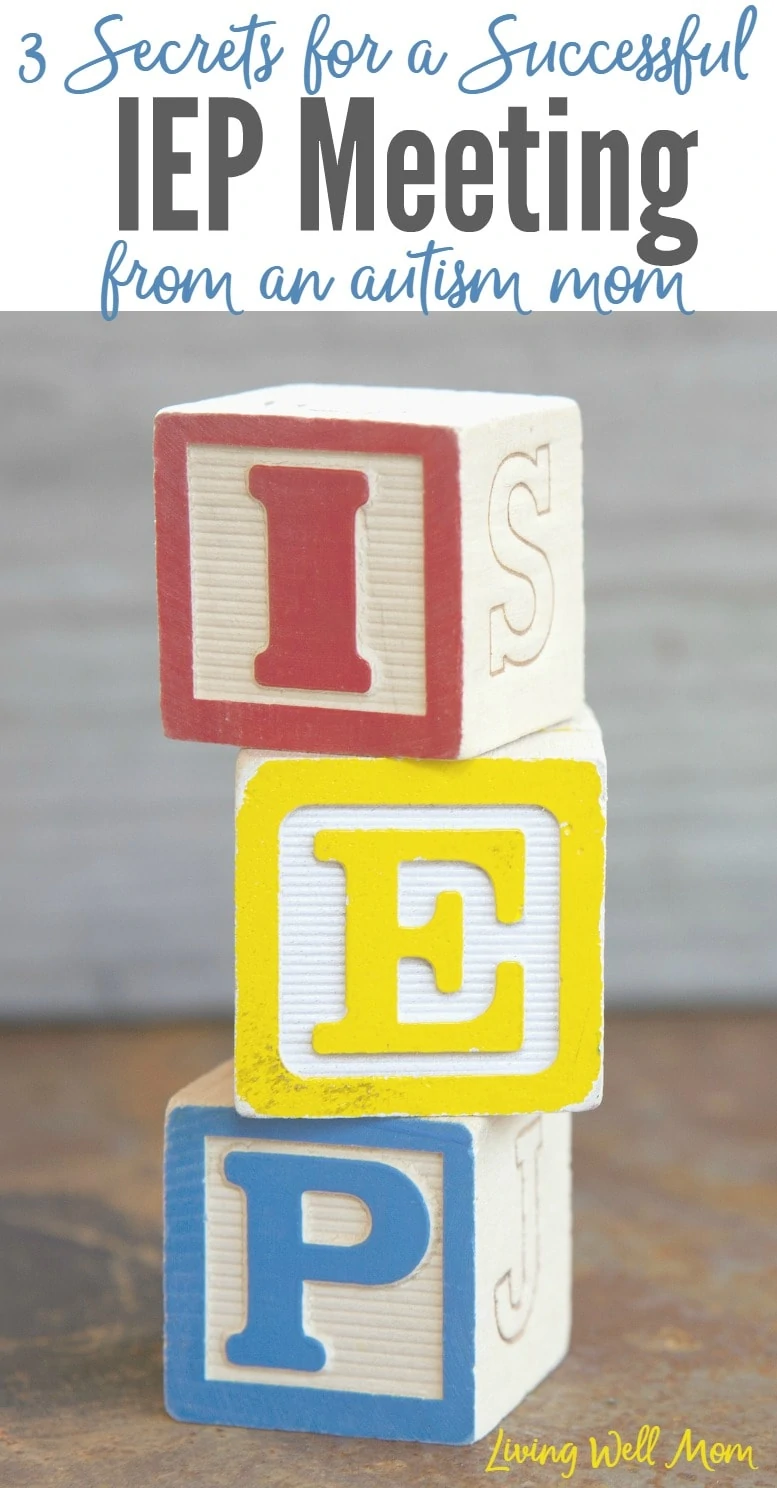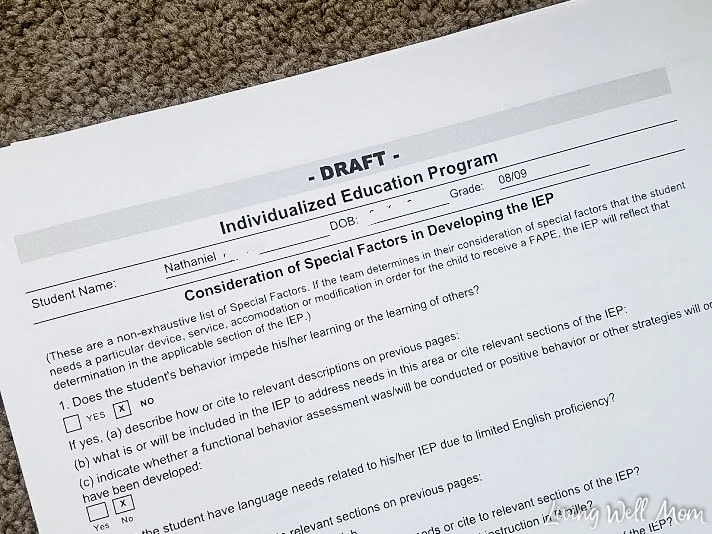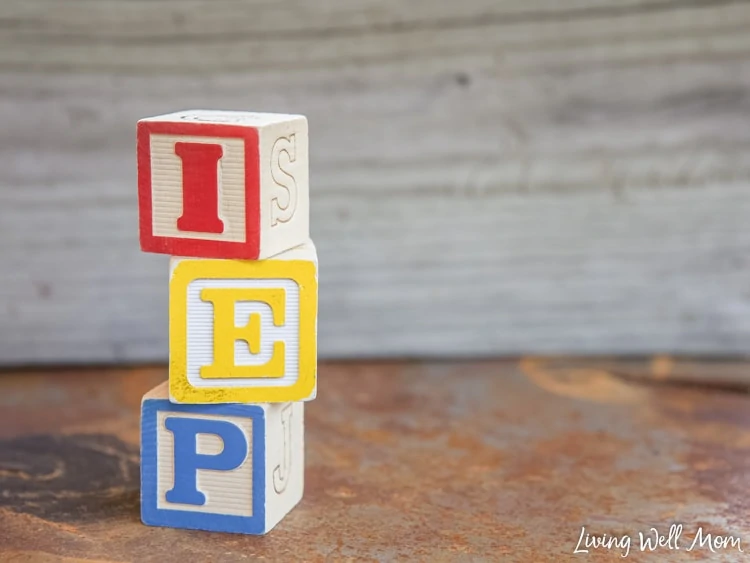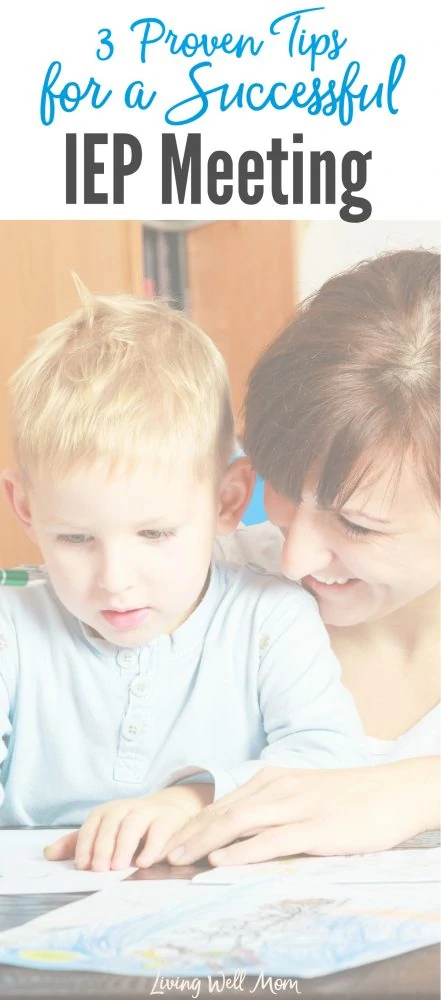My son, Nathan, has high functioning autism. He’s finishing 8th grade and starting high school next fall. And, no, I’m NOT ready!
He has an IEP with his school and last week, I attended an IEP meeting where we discussed the annual new IEP. The meeting went really well, partly due to the amazing team at my son’s school and partly because I have learned a few simple tips that I want to share with you today.
If your child has autism or another learning disability that requires an IEP or even 504 plan, here are a few tips to consider as you plan for those meetings.
3 Secrets for a Successful IEP Meeting
#1 Ask for the IEP draft ahead of time
Some schools automatically give you a copy of the IEP draft before the meeting because state law requires it, but not every state does. While you can’t force a school to comply with this simple request, it doesn’t hurt to ask.
My kids’ schools do this and either send home a copy with my child or mail it a few days before the meeting. (My 7-year-old has an IEP as well for speech/language.)
Reviewing the draft ahead of time can be very helpful. It’s much easier to read the IEP draft at home in your own time without the pressure of the special education team staring at you (however awesome or not they may be.)
I also have my husband look over the draft so he can add his own input. (Usually, he doesn’t attend the meetings due to his work schedule.)
When you can look at the IEP draft ahead of time, it gives you the chance to take notes so you don’t forget anything you want to discuss at the official IEP meeting.
I take very detailed notes – ie: page 3 under section V, paragraph 2, etc. and even rewrite sentences in my own words if I don’t like the current wording. (My son’s team liked this and actually put my exact wording recommendation into the official IEP.) This isn’t to say that every team will do the same, but at least reviewing the IEP draft ahead of time gives you time to think about the input you want to give!
#2 Don’t be afraid to think outside the box.
Often, IEPs have formal language that doesn’t always seem applicable to your child. Sometimes things are simply worded differently than you would choose to, but other times things really don’t make sense.
Don’t be afraid to ask questions and ask the special education team to clarify sections. This is your child’s official education plan!
I had our team change a few lines throughout Nathan’s IEP because it wasn’t entirely accurate. Something like “often” can be very different than “on occasion” with a specific situation.
If there are big or little things you can think of that would help your child succeed better in school, the IEP meeting is a great time to bring them up and ask for them to be added to the official plan.
This can be little things like allowing your child to play with a fidget toy during a certain class because it helps him stay calm or a specific strategy to help calm her down if she gets upset.
My son does better if he’s given very clear options instead of vague statements. For example, if he was asked to leave class to attend speech therapy, in the past the therapist would simply ask if he wanted to come with them. Naturally, Nathan would say “no” because he wanted to stay in class and finish what he was doing. Then we would hear from the school a month or two later that Nathan was “resisting” going to therapy.
After I talked with the school and found out what was happening, I told them they needed to stop giving Nathan an option, since he really didn’t have a choice then. Instead, they need to clearly tell him “It’s time for therapy, please come with me.”
Ever since they changed this approach, he’s attended every therapy session. (We’ve also been able to reinforce from home on therapy days.)
As a result of this, I asked that they put a note in the official IEP and now everyone works better with it.
Sometimes things that are very obvious to us parents are not obvious to others, especially our children’s schools. Even simple things like communication.
#3 Ask about progress
IEPs can be depressing to read and go over at meetings because it’s often all about your child’s challenges. Sometimes, your child will behave differently at school than at home and it’s discouraging to read how many frustrating aspects there are when you thought he was doing better!
I want to remind you of something that helps me. Remember the purpose of the IEP. It’s to help teachers and staff understand and help your child succeed.
And as discouraging as it can be to read, sometimes the staff really does need to know those things. On the other hand, if you’re reading things that don’t actually sound like your child, as I mentioned in the section before this, don’t be afraid to speak up!
Still, I do wish IEPs included a section that talked about the child’s strength and any progress he or she has made.
TIP: Just because the IEP doesn’t formally include something, it doesn’t mean you can’t ask!
This was new for me too and I asked my son’s team about any progress he has made.
It was funny to see their faces because they genuinely looked surprised like they had never been asked that in a meeting before.
I heard things like: “he’s making more of an effort to make friends.” “He’s more aware of his surroundings and actions.” “He’s very apologetic after he does have an issue.”
The autism behavioral specialist made my day when she told me how much she loves working with Nathan and how he’s always willing to learn, understand, and apply new things.
Don’t be afraid to ask this simple question. It really can help YOU, mama!
Bonus Tip: Do what you have to do to feel confident and strong
I did my hair and makeup and wore clothes that I felt great in when I went to the IEP meeting. Yes, those are simple “outward” things, but they helped me stand a little taller and feel more confident as I spoke up at the meeting.
If that helps you, do it too!
Or maybe you need to bring someone for moral support – your spouse, your mom, sister, or best friend.
You do what you have to do to make this work, mama, and that’s okay!
A note to moms who are fighting uphill battles with your child’s school: you are real warriors and you are amazing.
Keep fighting. You will NEVER be sorry you fought for your child.
For more tips for IEP meetings, read this post: 17 Things Autism Moms Want You to Know About IEPs





Carla B says
Hi Erika, terrific article on IEP tips. I am the mom on a 30 year old son with autism, HF. If you encounter your son having difficulty transitioning to speech this year, it is helpful to write into the IEP that speech therapy is held at the same day and time, and that the staff reminds him (as well as at home) so transition time is less stressful for him.